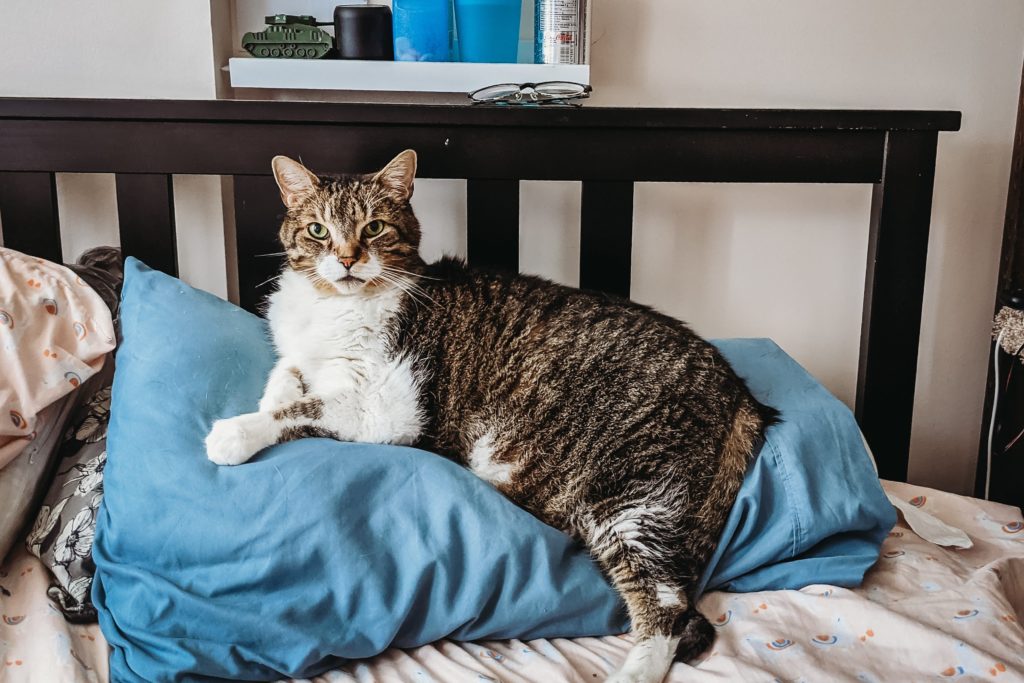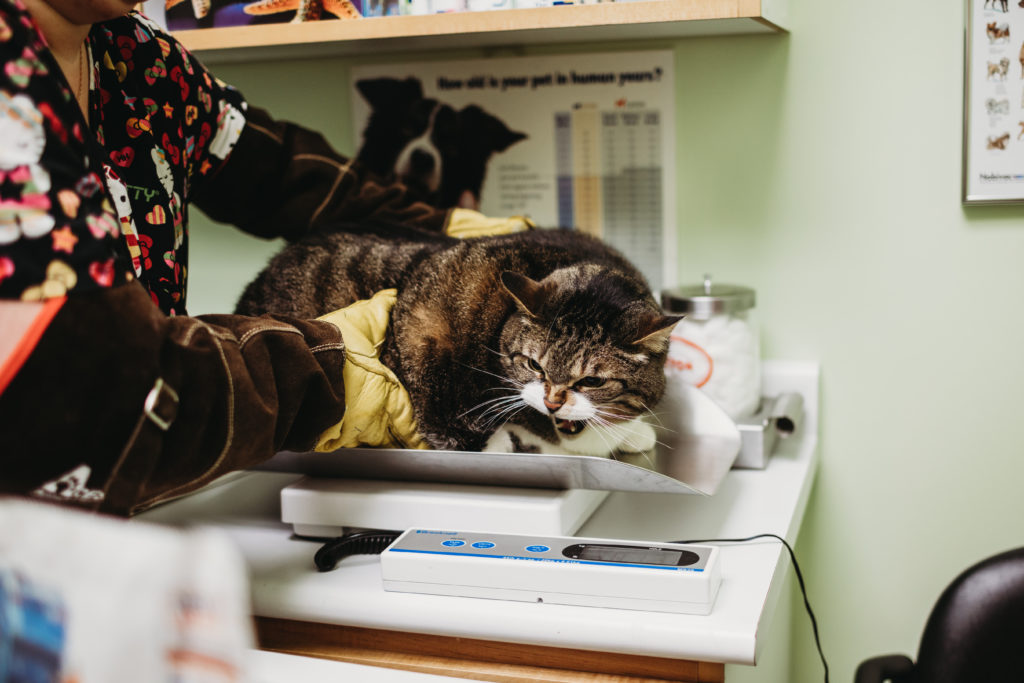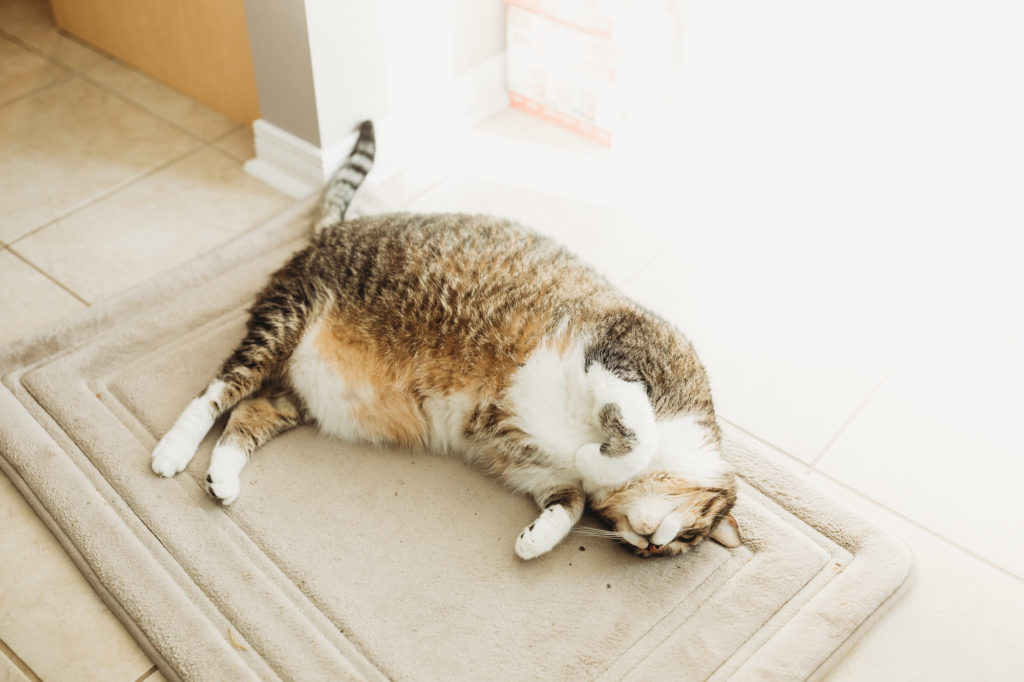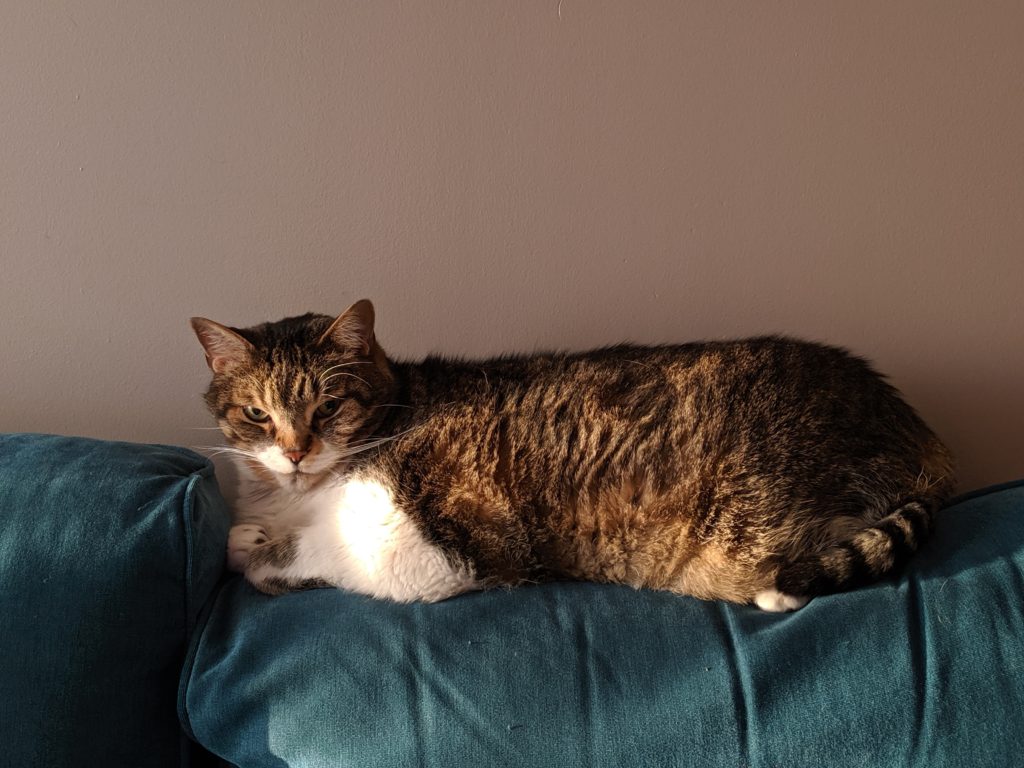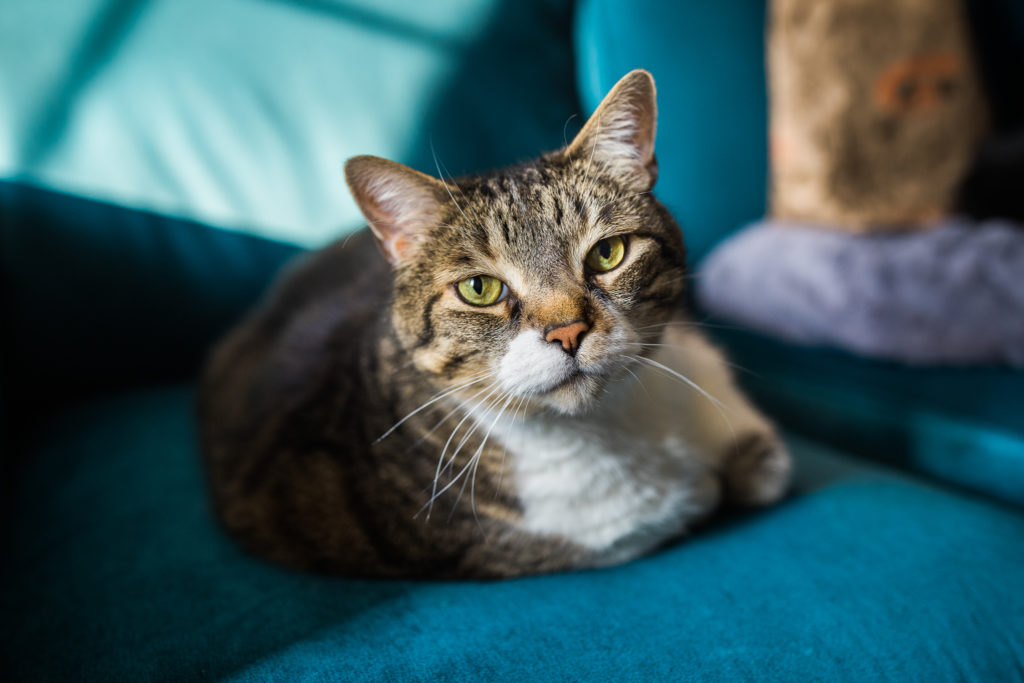Feline Obesity
Everything you want to know about your Chonky Cat
Having a chonky cat doesn’t make you a bad owner; let’s clear the air and talk openly, without judgement, about feline obesity and what we can do to make sure your fur baby has as many high quality years of life as possible.
Promoting blame-free and shame-free environments
Sharing personal stories + educational resources
Advocating for vet-guided weight-loss plans
Talking about Feline Obesity:
What Makes us Different?
Hercules battled his weight from the moment he rapidly packed on the pounds after getting neutered. He spent so much of his life having his food monitored and on formal diet plans, and when we started our official veterinary weight loss plan, we documented the experience on Instagram.
We didn’t expect his insta to become so popular, but a community of like-minded “furriends” joined us and encouraged Hercules, and us, through his ups and downs. Well – most of them were awesome.
Having a fat cat on the internet can bring about the trolls. The people who shame, name-call, and say downright terrible things. Their comments reminded us of just how much intolerance and hatred of larger bodies exists in the world. So that’s why we do things a little differently around here.
We know that it’s possible to talk about your cat’s weight in a kind, understanding, and respectful way. We educate about feline obesity and we believe in:
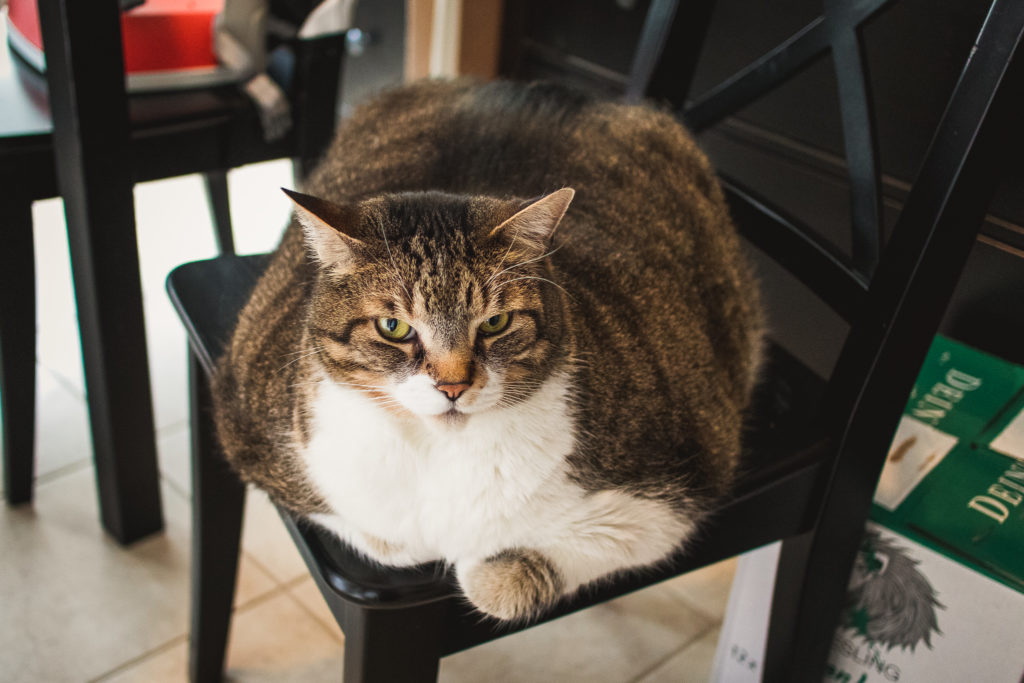
NO OWNER SHAMING OR BLAMING
Having a fat cat does not mean you’re a bad owner, we are here to support you and to help you learn more about feline obesity and nutrition.
HUMILITY IS AT THE FOREFRONT
We struggled with Herc’s weight most of his life; we made mistakes but also had many successes. We humbly share our experiences to help others learn
‘HEALTHY’ IS INDEPENDENT OF RESPECT
Whether a body is ‘healthy’ or not, they deserve respect, compassion, and guidance. We believe that you don’t owe anybody “health” just to be respected; all bodies – cat or human – are welcomed and valued here
Hercules gained weight astronomically quickly after his neuter. We thought we were doing the right thing to help get it under control, but with a lack of available and accessible education, we made mistakes. Once we found an amazing vet and vet tech team, Hercules found success with his weight loss – even though there were many bumps in the road. Learn from us – you’re not alone!
Popular topics
Start tracking your success
Get Instant Access to our Feline Weight Tracker
Grab our exclusive cat weight tracker printable, complete with multiple weight ranges, measurement units, and Hercule’s personal sample chart.
Send it to me
right meow!
You’re also subscribing to our mailing list. You can unsubscribe at any time.
Is Being Fat Hurting My Cat?
Fluffy may be an adorable chonk, but are those extra pounds hurting them now?
Will they hurt him in the future?
Feline Obesity and Pain
If you’ve been wondering if being overweight is hurting your cat, the answer is – unfortunately – yes. Pain may result from carrying around extra pounds and even if your cat doesn’t appear to be in pain now, keeping those extra pounds on their little frames can contribute to a lower quality of life in the future.
Being overweight can cause pain because it sets the stage for the following:
- Osteoarthritis
- Joint damage
- Tendon and ligament damage
- Inflammation
It’s important to remember that cat’s don’t often show how much pain they are in. They are stoic and sneaky little furballs who, unfortunately, will put up with a lot of discomfort and pain silently before any signs show. By the time your cat starts showing signs of being in pain or discomfort, they likely have already been in that state for quite some time.
Feline Obesity and Risk Factors
When wondering if being fat is hurting your cat, you also need to consider that pain (or hurt) isn’t just something that matters in the present. Carrying extra weight can set the stage for future problems. Although your cat may not be experiencing these problems now, they will be at an increased risk of developing them in the future if their weight is not managed.
Feline obesity can increase your cat’s susceptibility to health complications in the future, including:
It’s never too late to address feline obesity and work on a weight management plan for your cat. Whether you do this when they’re 3 years old or 13 years old, helping your cat lose weight will show your cat how much you love them.
More on Feline Obesity
>> See More on Feline Obesity
A Must-Have for Ever Vet Clinic
Does yours have this?
Every vet office should have a weight loss program run either by a vet or an RVT where every patient is consulted into the program either with a new patient booking, upon yearly checkup, or after their spay/neuter in order to prevent obesity or address obesity as quickly as possible.
Spotlight on RVTs
Our spotlight is on Rebecca – yes, the famous Rebecca! Hercule’s arch-nemesis, weight loss coach, and incredibly dedicated RVT.
Rebecca, along with Herc’s vet Cheryl, was integral in starting and maintaining the weight loss clinic at Hercule’s first veterinary clinic. The program started in mid-2015 and is still running.
Not all vet offices have weight loss programs; we’ll learn more about feline obesity and feline weight loss from Rebecca in our Spotlight article.
The reasons for feline obesity
Many different things can contribute to a cat’s likelihood to become overweight. Yes, calories matter – overfeeding a cat (whether intentionally or not) will contribute to them gaining weight; however, some cats are much more sensitive to excess calories than others.
Neutered and spayed cats are at a higher risk for feline obesity as well as cats of certain breeds like Domestic Shorthair cats. Medical conditions such as acromegaly or hypothyroidism can also contribute to weight gain as well as the age and sex of a cat, with male cats being at higher risk for feline obesity.
Despite the fact that your cat may be at a higher risk for feline obesity, there are always options available to balance their nutrition and start a weight loss journey.
Why can’t my fat cat lose weight?
Weight loss doesn’t come easy for all cats; Hercules had a very hard time losing weight but with persistence, it eventually happened! I wasn’t the only fat cat owner to wonder why my cat couldn’t lose weight and I won’t be the last.
If your fat cat isn’t losing weight, you need to go back to the basics and double and triple-check several things before you draw the conclusion that their metabolism is just ‘slower’. This means that you need to know the answers with 100% certainty and not just assume that you know the answers.
Why is my Cat Fat?
| What’s Going On | What to Try |
|---|---|
| Are you doing a DIY diet? | Consult your vet or vet tech and get them to review what you’re doing. It’s possible you could still be overfeeding your cat. |
| Are you feeding exclusively kibble/dry food? | Kibble is calorie-dense; wet food provides your cat more volume of food and often contains proportionally more protein |
| Are you feeding a mix of kibble and wet? | Try changing up the proportion of kibble to wet food or even consider feeding exclusively wet food. |
| How are you measuring kibble? | Are you using a measuring cup specific for that amount? Or is the cup bigger and you’re “eyeballing” the amount? Measuring cups can be inaccurate – consider a kitchen scale and measure in grams/ounces. |
| Is there anyone in the house who could be giving the cat treats? | Treats can be in cat form or human form; whether it’s a partner, roommate, or child. Depending on where the source of extra food may be coming from, you may need to either keep treats out of the house entirely or monitor when the cat is around certain individuals (like children). |
| Could someone else be providing meals? | Miscommunications can happen, but if they happen too often they can hinder weight loss. If Fluffy gets “second breakfast” because someone else is feeding them, weight loss will be jeopardized. Simplify things – only 1 person should be feeding the cat. |
| How are you stopping the cat from accessing other animals’ food? | A “hungry” cat will eat dog food and other foods they previously may have turned their nose to. If you have more than 1 animal (including non-cats) how are you stopping food access? |
| Are there any other food sources the cat could be getting at? | Think critically here – kids dropping snacks? Food that’s been left on the table? Half-finished yogurt cups on the counter? Ensuring that all food is inaccessible is necessary. |
| How many times a day are you feeding the cat? | Feeding smaller meals more often may help your cat feel satiated and lead to less food-seeking behavior. |
| Are you feeding pet store food or veterinary food? | Weight loss can absolutely happen with pet store food; but if it’s not happening, you may want to consider switching to a veterinary prescribed food or at least ensure you’re feeding a WSAVA approved food for maximum nutritional impact. |
| How much are they moving around the house? | Put as much distance between their litter box, their food, and their water as possible. Encourage them to use as much of the house as possible, including vertical spaces. |
| Are they getting enough exercise? | Are you taking time to play with your cat? Or have you purchased toys in hopes they engage in play by themselves? Try devoting 30 minutes a day to play. |
| Are you weighing your cat on a bathroom scale? | Are you taking time to play with your cat? Or have you purchased toys in hopes they engage in play by themselves? Try devoting 30 minutes a day to play. |
| Has your cat had a veterinary exam? | Are you taking time to play with your cat? Or have you purchased toys in hopes they engage in play by themselves? Try devoting 30 minutes a day to play. |
How to Put your Fat Cat on a Diet:
Where do you begin when you’re dealing with feline obesity?
Don’t know where to begin?
Get your road map now
How many calories can a cat eat in a day?
Calculating a Calorie Deficit
I’m a firm believer in the fact that feline obesity and weight loss management should be a collaboration between a veterinary team and an owner. I believe this for many reasons – most importantly because if weight loss calculations are done incorrectly, they can put your cat at consideration right.
If, however, you absolutely do not have access to a vet team or your vet team does not have a weight loss program and no second opinion can be sought, there are cat calorie calculators available online.
If you are using an online feline calorie calculator, like the one at Vetcalculators.com, here’s how to make the most of them:
- Set Weight in Lbs or Kgs
- Make sure you are using a pediatric scale, not a bathroom scale
- Set Body Condition Score
- Click on the cat icon and a pop-up window will appear to show you different ‘shapes’ of cat bodies
- Select the shape that most resembles your cat
- Choose Species
- Make sure you’re on “cat” or things will not calculate properly
- Select Pet Criteria:
- Choose Weightloss
- Your pet may be inactive/obese, but that setting will not provide what you a calorie deficit – that is for maintenance
- Choose Weightloss
- The MER Maintenance Energy Requirement is the approximate calorie amount they suggest you feed for weightloss
(Potentially) Deadly Mistakes and How to Avoid Them
When your cat isn’t eating enough food, they can develop a potentially deadly condition known as hepatic lipidosis – aka fatty liver disease. Cats who are already dealing with feline obesity are at an increased risk of fatty liver disease already.
If you want to avoid the risk of fatty liver disease when putting your cat on a diet, please work with your vet team as opposed to doing things yourself.
It can get complicated
Tackling feline obesity and putting your cat on a diet can get complicated, depending on your cat’s medical history and any possible underlying medical conditions. This is something that only the expertise of a vet and vet tech can work with. Examples of complicated situations are putting your cat on a diet but also having to consider nutritional needs for things like kidney disease, IBD, urinary problems, skin issues, or allergies.
I know cats don’t like to listen,
but we need to make sure you know this…
We are not veterinarians and the information on this site is not medical advice.
We are sharing Hercules’s battle with feline obesity and feline pancreatitis. A lot of what we’re sharing is personal experiences and if not, contains links to where we’re referring information from.
Our goal is to use our background in human healthcare and knack for writing to help make medical-jargon-filled information more digestible and accessible to the average cat owner.
Educating yourself is essential and I’m glad you’re here for that, but the next step is crucial: Always discuss any concerns you have or any interventions you want to try out with your veterinarian.
Never rely exclusively on the internet no matter how reliable the website sounds!
Do fat cats
“promote obesity”?
The internet loves chonky cats, but is their sheer presence online romanticizing feline obesity?
Existing is not the same thing as promoting
A fat animal (or person) who is simply existing does not qualify as that animal (or person) “promoting” obesity. This is a concept that many people struggle to understand when dealing with other human beings, let alone when interacting with animal accounts on the internet.
So what does ‘promoting’ something look like?
Promoting means to further the progress of or to actively encourage something – like a cause, a belief, or a message). Unless someone is posting their fat cat online with the explicit message advocating for all cats to gain weight or to purposeful overfeed their cat then they are not promoting obesity, clout chasing, or looking for fame.
Are there people accounts out there who may be purposefully doing this to animals? I haven’t come across any myself and I certainly hope there aren’t, but if there are then appropriate action needs to be taken. Here’s what to do if you think someone is purposefully overfeeding their animal.
Why do we share Hercules’s weight loss journey?
Feline obesity is a growing problem across the globe and Hercules’s message has always been to raise awareness around feline obesity, share education and information about what it’s like to put your cat on a diet, and we do all of that while entertaining. After all, people aren’t going to pay attention to a boring account, right?
When people hop onto a social media page and leave comments harassing a pet owner over their cat’s appearance, it speaks volumes as to the kind of person that they really are – especially when they don’t even take the time to check that the account is there to educate on feline obesity!
If a troll thinks that a cat account that has been devoted to sharing information about feline weight loss is “promoting obesity” then it’s as simple as delete, block, and move on.
How to Get a Fat Cat to Exercise
Exercise is only one component of weight loss and an overall smaller contributing factor in the plan to tackle feline obesity. With that being said, though, exercise is still important!
Getting a cat to do anything that they don’t want to is challenging enough on its own, let alone trying to get your fat cat to exercise. Good news! It’s not impossible, you just need to get creative.
Will Shaming Owners Help a Cat Lose Weight?
Shaming an owner that has a fat cat is the least productive thing you can do if your goal truly is to help the animal. Shaming can be internalized by the owner and lead to anxiety, depression and a avoidance of the subject in the future.
If shaming doesn’t work, how can you engage with the owner of a fat cat and have a successful conversation?
More on FatCatHercules
>>More on FatCatHercules
>>More on Feline Obesity
Get the look
Celebrate FatCatHercules
Hercules has had ‘merch’ for many years; we’ve unarchived some of his classic designs for our new shop.
All merch sales go directly to compensation for the maintenance of this website.
-

 Eat the Haters 🌈 Rainbow$23.75 – $28.74
Eat the Haters 🌈 Rainbow$23.75 – $28.74 -
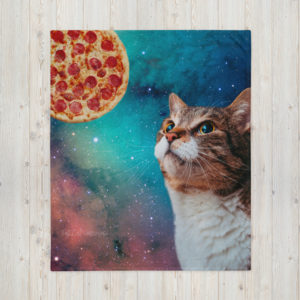 Galaxy Pizza Fat Cat Throw$54.99
Galaxy Pizza Fat Cat Throw$54.99
Feline Obesity + Hercules: FAQs
Want to know what we would do if we were in your situation? Drop us an email and we can share our perspective in our next WWHD (What Would Herc Do) blog post.
